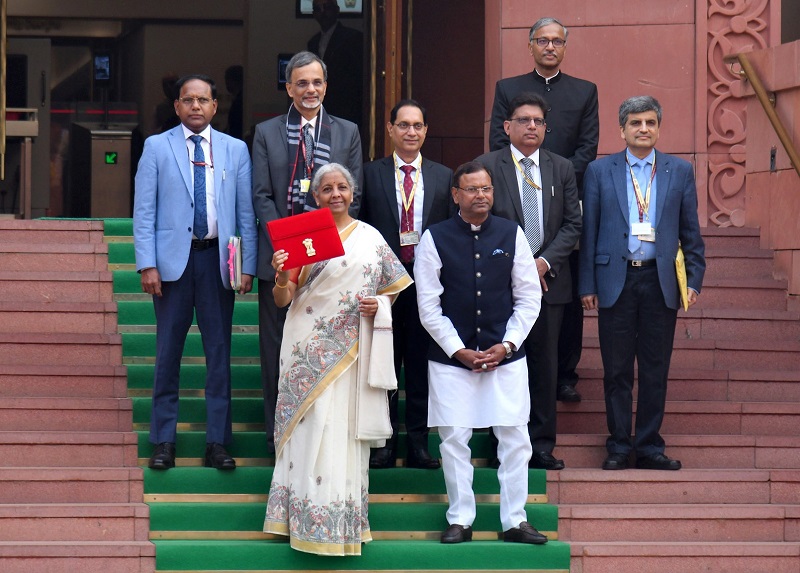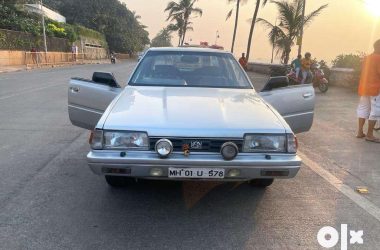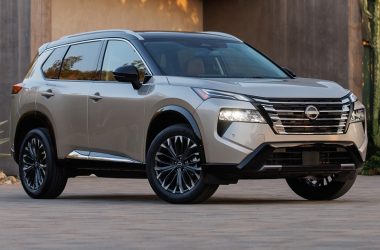New Delhi – The recently unveiled Indian budget has set the automotive industry abuzz, with leaders across the sector praising the government’s forward-looking initiatives. A series of statements from top automotive CEOs highlight a unified optimism toward a future driven by electrification, innovation, and sustainable growth.

Tata Motors Exec Applauds Budget 2025 as a Blueprint for India’s Transformation
Girish Wagh, Executive Director of Tata Motors, lauded the Union Budget 2025 for charting a clear course toward long-term economic transformation and a ‘Viksit Bharat.’ He noted that the budget’s progressive policies and robust allocation of over Rs. 11 lakh crore in capital expenditure are poised to modernize infrastructure, spur economic growth, and promote inclusive development.
Wagh emphasized that targeted measures to boost consumption, reinforce the ‘Make in India’ initiative, and support agricultural growth will create a dynamic economic landscape. He also highlighted the strategic removal of basic customs duties on key materials for battery manufacturing, a move designed to lower production costs, boost domestic EV production, and accelerate India’s transition to a greener economy.
Furthermore, as infrastructure projects gain momentum and consumer demand rises, improved roads, connectivity, and logistics are expected to drive increased demand for freight and commercial transport solutions, reinforcing broader economic recovery.
Renault India CEO Applauds Budget 2025 as a Blueprint for Sustainable Growth
Renault India welcomes the transformative vision unveiled by Finance Minister Nirmala Sitharaman in the Union Budget 2025. Venkatram Mamillapalle, Country CEO and MD, Renault India, expressed confidence in the budget’s focus on agriculture, MSME development, investment, and exports as a promising pathway for India’s growth.
“We commend the Dhan-Dhaanya Krishi Yojana, which benefits 1.7 crore farmers, and the revised tax structure that exempts income up to ₹12 lakh—measures that are expected to boost consumer spending and positively influence vehicle purchases, particularly among the expanding middle class,” said Mamillapalle.
Highlighting the government’s commitment to bolstering domestic manufacturing, he added, “The National Manufacturing Mission strengthens the ‘Make in India’ initiative with robust policy support and clear execution roadmaps. By prioritising rural development, tax reforms, and clean-tech manufacturing, the budget lays a strong foundation for a greener, more prosperous future.”
Mercedes-Benz India CEO Applauds Budget Reforms for Global Integration and EV Growth
In the wake of the Union Budget 2025 announcement, Santosh Iyer, Managing Director & CEO of Mercedes-Benz India, shared an optimistic reaction that highlighted the transformative potential of the fiscal measures.
Iyer noted that while India has often been viewed as a niche market with high barriers, the latest budget is set to redefine this perception by both stimulating domestic consumption and opening up international trade channels. He remarked:
“India has long been regarded as a niche garden with high fences, however, this budget is expected not only to enrich the garden by stimulating consumption and strengthening the MSME sector, but also lowering the fences through tariff rationalization and adoption of international practices on transfer pricing, with a clear commitment to enhanced global trade integration. This will send a strong positive signal to the industry, reinforcing confidence in the ‘India Growth Story’, paving the way for sustained investment and future expansion. The announcement of setting up of National Manufacturing Mission’s for clean technology manufacturing and support to domestic EV battery manufacturing is a positive step towards strengthening the EV ecosystem. We also welcome the setting up of a high-level committee to evaluate regulatory reforms which will enhance ease of doing business in the long term.”
Toyota India Endorses Union Budget 2025-26: Championing Reforms, Infrastructure, and Clean Technology
Toyota Kirloskar Motor has voiced strong approval for the Union Budget 2025-26, with Vikram Gulati, Country Head and Executive Vice President – Corporate Affairs and Governance, emphasizing the comprehensive reforms aimed at driving holistic national development.
Gulati highlighted that the budget’s focus on reforms, robust infrastructure development, reinforced fiscal discipline, and rationalized taxation is designed to foster domestic manufacturing and spur economic growth. He noted that the increased allocation for capital expenditure reflects the government’s persistent commitment to modernizing infrastructure—a critical factor for accelerating growth and enhancing competitiveness across sectors, including the automotive industry.
Furthermore, Gulati pointed out that the budget’s measures to lower taxation through revised Income Tax provisions and the introduction of the PM Dhan Dhyan Krishi Yojana for the farming community are set to significantly benefit the common man. These initiatives are expected to stimulate consumption and generate demand, thereby propelling faster economic expansion.
He also praised the continued support extended to MSMEs, particularly those in labor-intensive sectors and first-time entrepreneurial ventures, which is poised to spur innovation and growth. This support aligns seamlessly with India’s ambition of emerging as a global manufacturing powerhouse.
In addition, the inclusion of 35 additional capital goods for EV battery manufacturing was commended as a pivotal move towards localizing lithium-ion battery production. According to Gulati, this strategy will help reduce import dependency, bolster India’s energy security, and accelerate the adoption of clean technology—all crucial steps in building a robust supply chain that supports the nation’s Carbon Neutrality goals for 2070.
Reaffirming the company’s commitment, Gulati stated, “At Toyota Kirloskar Motor, we stand firmly with the government’s vision of a self-reliant, sustainable, and globally competitive automotive industry. Our unwavering commitment to advancing clean energy technologies, deepening investments in local manufacturing, skilling our workforce, and contributing to India’s ‘Viksit Bharat’ vision reflects our dedication to driving economic growth while upholding environmental responsibility.”
Volkswagen India Brand Director Hails Budget 2025 as Catalyst for Automotive Innovation
Ashish Gupta, Brand Director of Volkswagen India, stated:
I believe that infrastructure growth driven by public-private partnerships and capital expenditure incentives will transform India into a globally competitive manufacturing hub. Furthermore, tax exemptions for individuals earning up to ₹12 lakh will increase disposable income, enhancing purchasing power and driving greater demand in the auto sector. At Volkswagen India, we are optimistic that these measures will reinforce India’s position as a leading automotive manufacturing hub.”
“Today’s Union Budget 2025 outlines a forward-thinking roadmap that strengthens India’s manufacturing ecosystem with a sharp focus on clean technology, skill development, and infrastructure growth. By prioritizing these sectors, India is progressing toward a circular economy where investments, innovation, and sustainable practices drive long-term growth, paving the way for a more self-reliant and innovative automotive industry.
The removal of Basic Customs Duty on critical materials—such as cobalt powder, lithium-ion battery waste, lead, and zinc—will bolster the nation’s battery ecosystem, while the inclusion of 35 additional capital goods in the exemption list for EV battery manufacturing is set to boost domestic production and reduce import reliance. Additionally, the establishment of five National Centres of Excellence will upskill talent for future-ready automotive innovation, crucial for shaping India’s clean tech landscape.
Budget Boost for Auto Industry: Rajeev Chaba Applauds Tax Relief and EV Manufacturing Drive
Rajeev Chaba, CEO Emeritus of JSW MG Motor India, has welcomed the Union Budget’s new measures, emphasizing their positive impact on both consumer sectors and the automotive industry. In his remarks, Chaba highlighted the significant benefits for young professionals and the strategic push towards bolstering domestic manufacturing.
During a recent briefing, Chaba stated:
“The Union Budget’s new tax regime introduces substantial relief for young earning professionals and this is a positive sign for all consumer-facing industries.
On the automotive front, the Government’s focus on enhancing domestic manufacturing capabilities and battery production will help India’s emerging EV market and boost local manufacturing.”
CEAT Spokesperson Lauds Union Budget for Its Comprehensive and Business-Friendly Reforms
Arnab Banerjee, CEAT spokesperson, remarked:
Lowering income tax for the middle class will boost disposable income, which in turn is expected to drive higher consumption and personal investment. Additionally, the projected reduction of the fiscal deficit to 4.4% next year is a positive indicator for government financial health and inflation management. Overall, it’s a well-balanced budget.”
“The Union Budget of India comprehensively addresses all key sectors of our economy—from agriculture and rural development to education, health, tourism, and infrastructure. It introduces fresh financial initiatives for agriculture, startups, and MSMEs, and places significant emphasis on improving the ease of doing business, especially by streamlining direct and indirect tax compliances.
Yokohama India CEO Champions Budget 2025 for Advancing Green Mobility and Sustainable Manufacturing
Harinder Singh, CEO & MD of Yokohama India, lauded the Union Budget 2025 for underscoring India’s commitment to enhancing its manufacturing ecosystem, driving sustainability, and fostering self-reliance. He stated:
“The Union Budget 2025 underscores India’s steadfast commitment to enhancing its manufacturing ecosystem, fostering sustainability, and driving self-reliance. The introduction of the National Manufacturing Mission and the push for clean-tech manufacturing are key enablers that will accelerate the country’s transition to green mobility. By prioritizing domestic production of EV batteries and solar panels, these measures are set to positively impact a wide array of sectors, including the tyre industry, which is essential to the electric vehicle revolution.
At Yokohama India, we are not only supporting the ‘Make in India’ initiative but actively advancing it. Our cutting-edge manufacturing facilities, like the latest addition of the Vizag plant and the existing one at Bahadurgarh, are designed to produce premium tyres tailored specifically to Indian road conditions, while also aligning with the government’s priority towards clean-production processes with ‘zero’ pollution levels. Additionally, we remain committed to generating local employment and upskilling the workforce. The government’s initiative to establish five National Centres of Excellence for skilling is an important step in closing the skills gap in advanced manufacturing and sustainable technologies, ensuring that India’s workforce is ready for the future.
Infrastructure development remains a cornerstone of India’s industrial growth. We welcome the government’s focus on Public-Private Partnerships (PPP) and the allocation of ₹1.5 lakh crore in interest-free loans for capital expenditure. A robust logistics and transportation network will not only enhance manufacturing efficiency but also help reduce costs and increase supply chain resilience, benefiting industries such as tyres.
Additionally, the tax relief for the middle class will drive higher disposable incomes, leading to greater consumption across sectors, including automobiles. As vehicle demand grows, this will have a positive ripple effect on the tyre industry, further reinforcing the sector’s growth trajectory.
While these announcements chart a promising course for the future, the industry continues to face challenges, particularly with high import duties on essential raw materials like natural rubber. The Union Budget makes significant strides toward strengthening India’s manufacturing base, and further rationalization of duties and enhanced policy support for raw material availability will help build a more robust and sustainable industry. These positive steps from the government reflect a clear vision, and we are confident that with continued focus on sustainability, skill development, and industry-friendly reforms, India’s position as a global automotive leader will only strengthen.”
With a keen eye on transforming India’s industrial landscape, Singh expressed optimism that these measures will drive innovation and growth, ensuring a sustainable future for the automotive and tyre sectors alike.
Zypp Electric Celebrates Budget 2025 as a Boon for Startups and Gig Workers
Rashi Aggarwal, Co-founder & Chief Business Officer of Zypp Electric, welcomed the Union Budget 2025, noting that it reaffirms India’s commitment to nurturing entrepreneurship and empowering the gig economy. She highlighted the government’s decision to launch a new ‘Fund of Funds for Startups’ with an additional ₹10,000 crore infusion, which is set to fuel innovation, create jobs, and drive inclusive growth—especially with targeted support for 5 lakh women, SC, and ST first-time entrepreneurs.
Aggarwal also praised the introduction of identity cards and healthcare coverage for gig workers under the PM-Jan Aarogya Yojana, calling it a landmark initiative to secure the livelihoods of millions in the gig economy. At Zypp Electric, where thousands of gig workers power sustainable last-mile deliveries, these measures are a game-changer. She added that access to social security and financial support will empower rider partners, enhance workforce stability, and accelerate the adoption of green mobility solutions across India.
“These forward-thinking initiatives not only strengthen India’s entrepreneurial landscape but also ensure the social security of the workforce driving our nation’s digital and mobility revolution,” Aggarwal concluded.
FADA President Praises Union Budget 2025-26 for Boosting Auto Retail and Sustainable Mobility
FADA President C S Vigneshwar has lauded the Union Budget 2025-26 as a well-balanced, growth-oriented plan that prioritizes middle-class spending, rural prosperity, and the empowerment of MSMEs. In his reaction, Vigneshwar highlighted several key measures that are expected to invigorate the auto retail sector and accelerate India’s transition toward sustainable mobility.
According to Vigneshwar, the decision to increase the income tax exemption limit to ₹12 lakh will inject more disposable income into households, directly boosting demand for two-wheelers, passenger vehicles, and electric vehicles. “This adjustment will enable consumers to upgrade their vehicles, thereby stimulating the market,” he noted.
The budget’s focus on the rural economy was also well received. Initiatives such as the Dhan Dhanya Krishi Yojana, which benefits 1.7 crore farmers, along with the expansion of the Kisan Credit Card loan limit, are poised to drive demand for tractors, small commercial vehicles, and two-wheelers in rural areas. “These measures will provide a much-needed uplift for the rural sector,” Vigneshwar explained.
Furthermore, enhanced support for MSMEs—through higher credit limits, improved fund-of-funds for startups, and innovative financing options—will strengthen the backbone of the economy. This support is expected to spur growth in auto dealerships and fleet businesses, further diversifying and strengthening domestic manufacturing capabilities.
The Union Budget’s emphasis on the National Manufacturing Mission and incentives for solar, EV batteries, and clean mobility infrastructure is anticipated to accelerate the growth of the electric vehicle sector. Such measures aim to position India as a global hub for sustainable mobility. Additionally, increasing the FDI cap for insurance to 100% is set to foster greater competition and introduce innovative financing options for auto buyers, thereby stimulating further demand.
FADA’s President concluded, “We welcome this progressive budget, which will fuel India’s auto retail sector across rural, urban, and electric vehicle segments, supporting the vision of ‘Viksit Bharat’ and paving the way for a future of sustainable mobility.”
FADA Applauds Union Budget 2025-26 as a Boost for Auto Growth
The Union Budget 2025-26 is hailed by FADA as a balanced, growth-oriented plan that prioritizes middle-class spending, rural prosperity, and MSME empowerment. The increase in the income tax exemption limit to ₹12 lakh is expected to boost demand for two-wheelers, passenger vehicles, and EVs by giving consumers extra disposable income.
Key rural initiatives like the Dhan Dhanya Krishi Yojana and expanded Kisan Credit Card limits will drive demand for tractors, small commercial vehicles, and two-wheelers. Enhanced support for MSMEs, along with the National Manufacturing Mission and incentives for solar, EV batteries, and clean mobility infrastructure, is set to accelerate the EV sector. Additionally, raising FDI for insurance to 100% should spur competition and innovative financing for auto buyers.
FADA welcomes this progressive budget as a vital step towards fueling India’s auto retail sector and realizing the vision of ‘Viksit Bharat’ and sustainable mobility.
Omega Seiki Chairman Applauds Interim Budget for Boosting Manufacturing and AI Skill Development
In response to the interim budget announcement today, Uday Narang, Founder and Chairman of Omega Seiki Pvt. Ltd., expressed his enthusiastic support for the fiscal measures outlined for the year 2025-26.
Narang highlighted that the removal of the Basic Customs Duty (BCD) on critical raw materials such as cobalt, lithium-ion battery scrap, and lead marks a pivotal step in strengthening India’s manufacturing ecosystem. “These materials are essential for the production of lithium batteries—the backbone of the electric vehicle and clean energy industries. By eliminating these duties, the government is not only reducing production costs but also accelerating the shift towards more affordable and sustainable technologies,” he stated.
He further emphasized that this bold policy initiative is expected to lower costs for consumers, making electric vehicles and electronics more accessible while promoting the growth of domestic industries. “With a focus on local manufacturing, the government is laying the foundation for India to emerge as a global leader in battery production and renewable energy technologies, significantly reducing our reliance on imports. At Omega Seiki, we are excited about the future prospects of this policy and its potential to drive innovation and sustainability in the sector,” added Narang.
Addressing the emphasis on skill development, Narang also praised the announcement of three Centres of Excellence in Artificial Intelligence, backed by a ₹500 crore allocation. “This initiative will significantly boost India’s technological and educational landscape by empowering the next generation with cutting-edge skills needed for tomorrow’s workforce. We believe that this forward-thinking investment in AI will drive innovation across sectors—especially in EVs, clean energy, and electronics—paving the way for a digitally proficient and globally competitive India,” he remarked.
With these measures, Narang envisions a transformative impact on both the manufacturing and technological arenas, positioning India on a robust trajectory towards sustainable economic growth and industrial innovation.
Fleetguard Filters MD Applauds Union Budget 2025 as a Catalyst for Manufacturing Growth
Niranjan Kirloskar, Managing Director of Fleetguard Filters Ltd, expressed his optimism following the unveiling of the Union Budget 2025. He highlighted that the government’s latest fiscal measures clearly demonstrate its commitment to boosting India’s manufacturing sector.
Kirloskar remarked:
“The Union Budget presented today demonstrates our government’s will to boost India’s manufacturing sector. Introducing a ‘National Manufacturing Mission,’ with an 89% increased allocation to ₹16,092 crore, highlights our government’s dedication to improving domestic production capabilities. Extending PLI schemes to various sectors is a good strategic move to diversify and strengthen local manufacturing. The much-needed tax reforms, like higher exemptions and simplifying tax slabs, will improve consumer sentiment and spending, invariably stimulating demand for various manufactured goods.
Additionally, the announcement to set up a centre for AI and readying talent for Industry 4.0 will provide a much-needed impetus to all industries, enabling crucial job creation and positioning us to ‘Make in India – For the World’. Lastly, a focus on infrastructure development and digitisation will create a more favourable environment for domestic manufacturing operations. I remain optimistic that these measures will enhance our nation’s global competitiveness and contribute to overall sustainable economic growth!”
Kirloskar’s comments underline a robust confidence in the government’s strategic initiatives to modernize domestic production and stimulate economic activity. The significant budget allocation for the National Manufacturing Mission, coupled with supportive policies such as extended PLI schemes and comprehensive tax reforms, is expected to invigorate the manufacturing ecosystem.
Moreover, the proactive steps towards establishing a centre for AI and nurturing talent for Industry 4.0 signal a forward-thinking approach, aimed at positioning India as a global leader in technological innovation and industrial advancement. This, along with enhanced infrastructure and digital initiatives, is anticipated to further fortify the environment for local manufacturing, setting the stage for sustainable long-term growth.
Union Budget 2025-26 Supercharges India’s EV Ambitions, Says Blue Energy Motors CEO
Blue Energy Motors CEO Anirudh Bhuwalka has hailed the Union Budget 2025-26 as a decisive step toward accelerating India’s transition to sustainable transportation. In his post-budget reaction, Bhuwalka emphasized that the government’s renewed focus on electric vehicles (EVs) and clean energy initiatives marks a significant milestone for the industry.
“The Union Budget 2025-26 reaffirms the government’s strong commitment to sustainable transportation and the rapid advancement of electric vehicles in India,” Bhuwalka said. He noted that the comprehensive reforms—ranging from enhanced financial support and tax incentives to substantial investments in EV infrastructure and battery manufacturing—are set to make electric mobility more accessible, affordable, and scalable.
Bhuwalka further highlighted that these measures perfectly align with Blue Energy Motors’ strategic vision, particularly following the company’s recent investment in Maharashtra to establish a state-of-the-art electric truck manufacturing facility. “With a robust policy push and growing domestic capabilities in battery technology, we are confident that India is on the fast track to accelerating clean-energy vehicle adoption, paving the way for a greener and more sustainable future,” he added.
Union Budget 2025-26: A Boost for Clean Tech and EV Ecosystem, Says Castrol India MD
In the Union Budget 2025-26 presented by Union Finance Minister Nirmala Sitharaman on February 1, we commend the government’s 10-point agenda aimed at fostering transformative reforms. These measures focus on ensuring an inclusive growth trajectory and driving employment-led development, aligning with the broader vision of Viksit Bharat for national progress.
The National Manufacturing Mission, outlined in the budget, is a key step in strengthening India’s clean tech manufacturing ecosystem. By offering tax exemptions on lithium battery production and 35 additional raw materials, the government aims to boost domestic EV battery manufacturing, reducing costs and driving demand for electric vehicles. This presents a valuable opportunity for us to expand our cutting-edge EV portfolio, including EV fluids, coolants, transmission fluids, and greases under Castrol ON. To further accelerate EV growth, we are enhancing R&D initiatives, advancing next-gen EV products, and strengthening OEM partnerships.
Our commitment to a future-ready workforce for the EV sector aligns well with the government’s skill development agenda. We have trained over 1,000 mechanics through our EV Readiness Program, upskilling auto mechanics nationwide.
Additionally, tax exemptions making income up to INR 12 lakh tax-free are expected to increase consumption and boost market demand across sectors, including the mobility sector and ancillaries like lubricants.
– Kedar Lele, MD, Castrol India Limited
Union Budget 2025-26 Sparks Optimism for Consumer Spending and EV Growth, Says Volvo Car India MD
In a post-budget statement, Jyoti Malhotra, Managing Director of Volvo Car India, expressed optimism about the Union Budget 2025-26. Accompanied by his picture, Malhotra noted that the budget appears geared toward stimulating consumer spending and driving economic growth.
“The Union Budget 2025-26 focuses on boosting disposable income through tax rationalization, which should in turn stimulate consumption,” he said. “The government’s commitment to maintaining capital expenditure without increasing taxes is a positive move.”
Highlighting the budget’s support for the electric vehicle sector, Malhotra added, “The emphasis on domestic value addition for EV batteries and the development of a robust EV ecosystem—encompassing battery recycling, a customs duty exemption on 35 capital goods for EV battery manufacturing, and expanded charging infrastructure—are encouraging initiatives that will promote EV adoption across various segments. By focusing on demand-side incentives without burdening taxpayers, the budget creates a favorable environment for EV growth.”
Overall, Malhotra described the budget as forward-looking and dedicated to sustainable economic development, setting the stage for a thriving future in both consumer markets and the EV industry.




